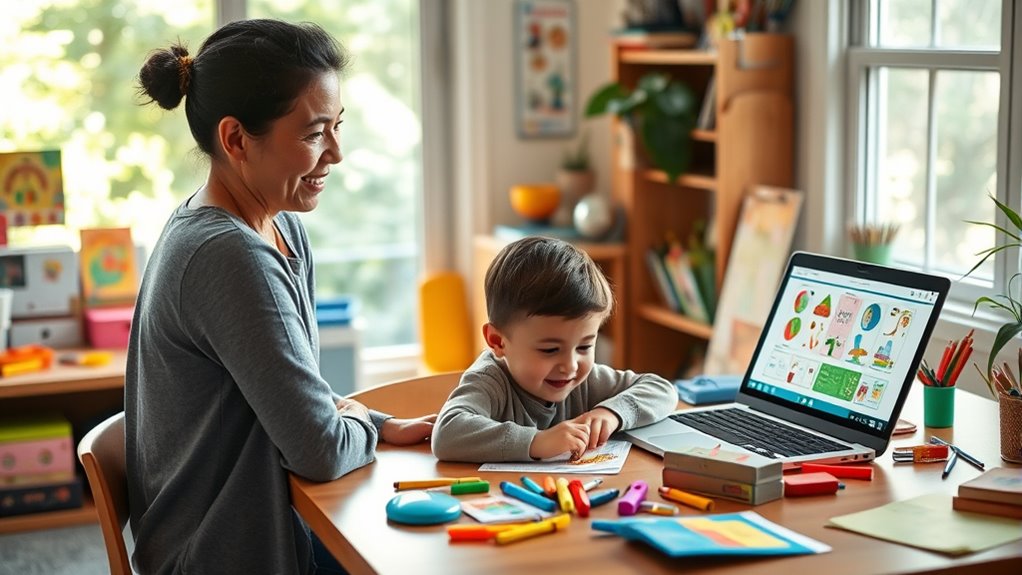Flexible education options like homeschooling and hybrid models let you customize learning to fit your lifestyle and goals. You can tailor lessons, choose your schedule, and use a mix of online resources and in-person activities. These approaches promote independence and socialization through community events and online communities. By combining technology and flexible scheduling, you gain control over your educational journey. Keep exploring to discover how these innovative options can work best for you and your aspirations.
Key Takeaways
- Homeschooling offers personalized curricula tailored to individual learning styles and interests.
- Hybrid models combine online digital resources with traditional classroom experiences for flexibility.
- Flexible education enhances socialization through community activities, online communities, and extracurricular involvement.
- Scheduling options in hybrid and homeschooling allow learners to align studies with personal rhythms and preferences.
- Technology integration in both models supports engaging, adaptable, and goal-oriented learning environments.

Are traditional classroom schedules holding you back from pursuing your educational goals? If so, flexible education options like homeschooling and hybrid models could be the solutions you need. These alternatives offer the freedom to tailor learning to your unique needs and circumstances, giving you more control over your educational journey. One of the key advantages is the ability to incorporate technology integration seamlessly into your learning environment. With online resources, educational apps, and virtual classrooms, you can access a wealth of information and interactive tools that make learning engaging and adaptable. Technology allows you to customize lessons, revisit challenging topics, and explore subjects beyond standard curricula. This flexibility can boost motivation and help you stay committed to your goals. Additionally, exploring diverse educational content can enrich your learning experience and keep you motivated throughout your studies.
Despite common concerns, socialization doesn’t have to suffer in flexible education setups. Many homeschooling families and hybrid programs develop effective socialization strategies to ensure students interact regularly with peers and adults. These strategies include participating in community events, joining extracurricular clubs, and attending co-op classes, sports, or arts programs. These opportunities foster collaboration, communication, and social skills that are crucial for personal and professional success. Moreover, online communities and virtual meetups enable you to connect with peers worldwide, broadening your social horizons beyond local boundaries. This approach not only nurtures friendships but also exposes you to diverse perspectives and cultures, enriching your educational experience.
Flexible education fosters social skills through community events, extracurriculars, online communities, and virtual meetups worldwide.
Flexibility in scheduling means you can align your studies with your natural rhythms, whether you’re a morning person or prefer studying in the evening. You can take breaks when needed, dedicate more time to subjects that interest you, or adapt your pace to avoid burnout. This personalized approach often leads to better retention and a more enjoyable learning experience. Hybrid models, in particular, combine the best of both worlds—online learning with periodic in-person sessions—offering structure while maintaining flexibility. You might spend part of your week studying independently online and meet with teachers or peers face-to-face for hands-on activities or discussions. This blend fosters independence while still providing essential social and academic support.
In essence, flexible education options empower you to craft an educational experience that fits your lifestyle and learning style. By leveraging technology integration and socialization strategies, you can overcome the limitations of traditional schooling and pursue your goals with confidence and enthusiasm. These alternatives open doors to personalized learning, meaningful social interactions, and the freedom to explore your passions on your own terms.
Frequently Asked Questions
How Do Homeschooling Families Access Extracurricular Activities?
You can access extracurricular activities through community involvement, such as local sports leagues, clubs, and art classes. Many homeschooling families collaborate with nearby organizations that offer programs tailored for homeschooled students. Some may seek extracurricular funding or grants to cover costs, making activities more affordable. By actively engaging with local communities and resources, you guarantee your kids participate in diverse activities that support their social and skill development.
What Are the Legal Requirements for Homeschooling?
You need to follow your state’s regulations for homeschooling, which often include submitting a notice of intent, maintaining accurate records, and testing or assessments. You also must guarantee your curriculum meets state standards and covers required subjects. Some states require periodic evaluations or portfolio reviews. Check your state’s Department of Education website for specific requirements, as laws vary widely but aim to ensure your child’s education stays compliant and thorough.
How Do Hybrid Models Support Socialization?
Hybrid models support socialization by providing regular opportunities for peer interaction through school days or extracurricular activities. You can foster community involvement by participating in local events or group classes, helping your child build friendships and develop social skills. These models balance home learning with social experiences, ensuring your child stays connected and engaged with peers, which is essential for their emotional and social development.
What Resources Are Available for Homeschooling Parents?
For homeschooling parents, plentiful resources provide support and structure. You can access online organizations offering curriculum planning tools, lesson ideas, and community connections. Local homeschool groups often host meetups, mentorships, and workshops, fostering parent support and socialization. Additionally, educational websites, forums, and co-ops deliver diverse materials and advice, helping you craft customized lessons. These resources empower you to confidently navigate homeschooling, ensuring your child’s education is engaging, effective, and enriching.
How Is Student Progress Assessed in Flexible Learning Models?
You assess student progress in flexible learning models through various assessment methods like quizzes, projects, and portfolio reviews. Progress tracking involves regular check-ins, digital logs, and personalized benchmarks to monitor development. By blending formative and summative assessments, you can gauge understanding, identify areas needing improvement, and guarantee the student stays on track with learning goals. This approach keeps you actively involved in your child’s educational journey.
Conclusion
Just as a river meanders freely through the landscape, flexible education options allow you to carve your own path. Homeschooling and hybrid models become the currents that adapt to your child’s unique flow, guiding them toward growth and discovery. Embrace these options as a voyage of exploration, where you hold the compass, and learning becomes a journey tailored to your family’s rhythm. In this ebb and flow, education becomes truly personalized and enriching.









